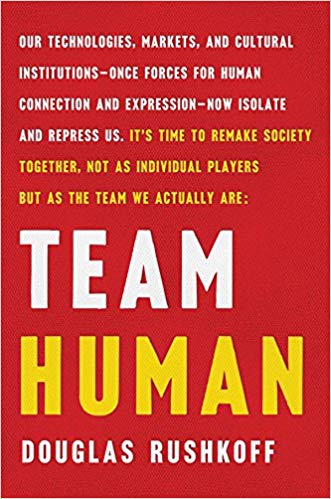You have /5 articles left.
Sign up for a free account or log in.
 Team Human by Douglas Rushkoff
Team Human by Douglas Rushkoff
Published in January 2019
In education, this takes the form of online courses that promise all the practical results for a fraction of the cost and inconvenience. The loftier goals of learning or enrichment are derided as inefficient self-indulgence, or the province of decadent elites. Online courses don’t require a campus or even a live teacher. A responsive, algorithmically generated curriculum of videos and interactive lessons is customized for the individual learner. It is the pinnacle of utilitarian education. -- Team Human (p. 46).
Team Human could serve as the economic manifesto for the progressive wing of the Democratic Party.
As a manifesto, the book is about perfect. It is concise, clocking in at a fast five hours and 36 minutes in audiobook format. Each chapter is broken up into small, reader-friendly segments.
Mostly, Team Human works as a manifesto as the text is not weighed down by anything so pedestrian as policy recommendations. Rushkoff is convincing in arguing that our economy no longer works for most people. Anyone who has been halfway paying attention to the rise of the gig economy, the growth of education debt and the hollowing out of middle-wage jobs will be sympathetic to the message of this book.
What is missing in Team Human is politics. Rushkoff is eloquent in talking about the psychic and social impacts of rising inequality. He does not bother to recommend policies that might reduce stratification.
What about universal health care? Or raising the minimum wage? Or supporting unions? Or taxing wealth at the same rate as income? Or universal childcare? Or expanding the Earned Income Tax Credit? Or taxing endowments of wealthy universities? Or shifting the tax structure to prevent wealthy families from disproportionately benefiting from 529 plans?
None of this is in Team Human. This might be a considered choice on Rushkoff’s behalf. Every political movement needs a set of big ideas. Policy recommendations can come later. What is required first is belief.
I like Rushkoff’s books. His books drive me crazy for their lack of connection to the world that we live in -- including the world of politics and policy -- but his books always make me think.
The fact that I like Rushkoff’s writing is why the quote that I put at the top of this review causes me some sadness.
Anyone of us who works in the field of online education knows that Rushkoff has no idea what he is talking about when it comes to online education.
It is clear from the quote that Rushkoff is conflating some version of MOOCs with what really goes on with online courses.
Maybe at this point, we are past the requirements to defend the quality of online education. Maybe.
But I still think that those of us in the online learning world must be vigilant in correcting gross mischaracterizations of our work.
How many readers -- including academic readers -- will pick up Team Human and have their prejudices against online education confirmed?
When you start to look for it, you see the conflation of MOOCs and traditional online education everywhere. It as if a particular class of aspirational public intellectuals first heard of online education during the Year of the MOOC (2012) and then decided that MOOCs are all online learning is now or ever will be.
How might we build an accurate image of online learning for those outside academia?
What opportunities do you see for those who have experience in creating and teaching high-quality, relationship-based and learner-centric online courses to describe this experience to a broad spectrum of readers?
Am I getting too wound up about a few sentences in an otherwise fascinating, if at times frustrating, concise book of big ideas?
What are you reading?








